📚 Lore Drops #5: The Imperium of Dragons [History]
THE IMPERIUM OF DRAGONS
From Ashes to Empire

In 2069, the world watched in horror as Beijing burned under its own nuclear fire. The final General Secretary of China, cornered by massive pro-democracy protests and facing the collapse of communist rule, chose annihilation over abdication. The mushroom clouds rising over the ancient capital became both an ending and a beginning.
But from the radioactive ashes of the old regime, citizens and militia across China and North Korea rose in unprecedented unity. The communist parties that had ruled for over a century crumbled within weeks, their leaders either fleeing, surrendering, or meeting justice at the hands of revolutionary tribunals. But nature abhors a vacuum, and into this chaos stepped those who would forge a new destiny.
October 1st, 2071: The Dragon Awakens
On the same date that once celebrated the People's Republic, a new banner rose over Chengdu—the golden dragon on crimson silk of the Imperium of Dragons (華龍帝國, Huálóng Dìguó). The symbolism was deliberate: where communism had failed, imperial tradition would succeed. Where ideology had divided, cultural heritage would unite.
The First Proclamation: "We are not the Middle Kingdom seeking to close itself from the world. We are the Dragon ascendant, embracing both our ancient wisdom and the promise of the stars. Those of true blood of Han shall find honor and purpose. Those who prove their worth shall find acceptance. Those who stand against us shall find only flame."
— Emperor Xue-Liang Zheng's Founding Address, Brocade Celestial Palace
The Constitutional Years (2071-2174)
Initially, the Imperium embraced a constitutional monarchy, balancing imperial authority with democratic institutions. The early emperors worked within legal frameworks, building legitimacy through economic prosperity rather than fear. When South Korea voluntarily joined in 2072, it seemed the Imperium might become a beacon of Asian unity and measured progress.
Yet not all answered the Dragon's call. Japan, still haunted by its own imperial past, politely but firmly declined the invitation. Taiwan, having fought so hard for its independence from communist rule, chose to chart its own course. These refusals planted seeds of resentment that would bloom into darker ambitions.
And power, like Zephyrium and Helionite in a fusion reactor, has a way of demanding ever-greater expression...
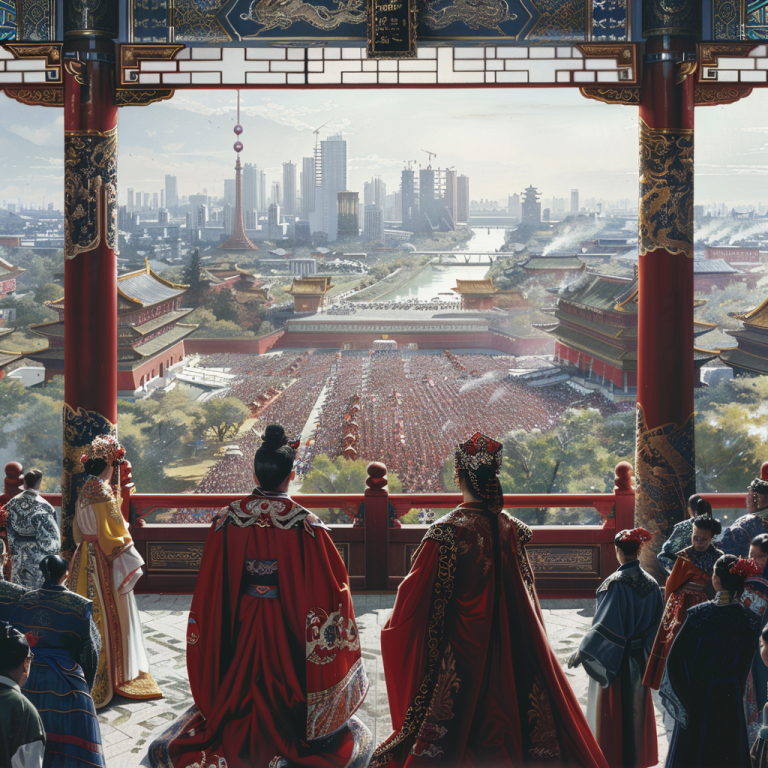
2174: The Dragon Claims the Stars
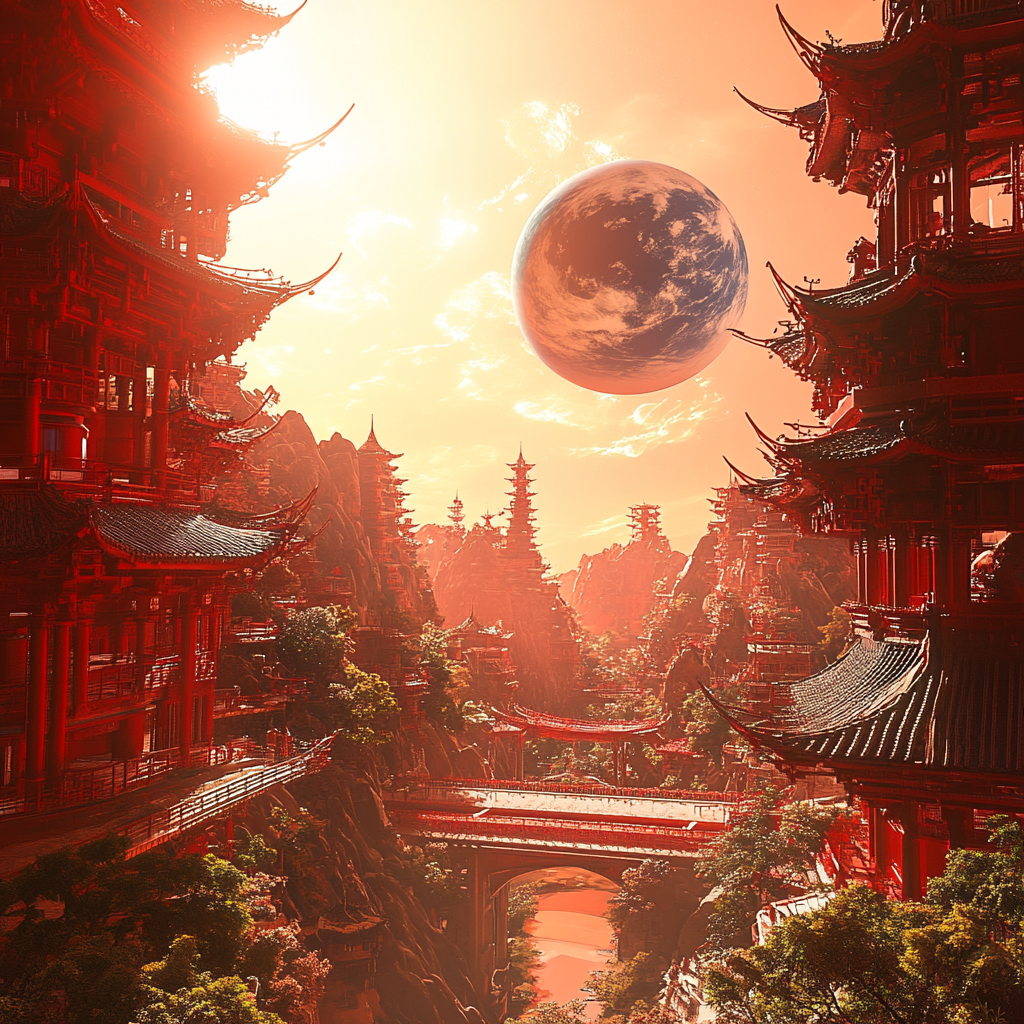
When House Sun seized power in 2174, they didn't merely inherit an empire—they transformed it. The Imperial Legion's landing in the Ocean of Storms marked humanity's first taste of the Imperium's true ambitions. Within months, Celestial Reach (蒼越城) rose from the lunar regolith, its pagoda-inspired towers reaching toward Earth like grasping claws.
But it was what lay beneath Osram's surface that changed everything. The Zephyrium deposits in the Ocean of Storms dwarfed anything found on Earth. With exclusive access to these crystalline treasures, the Imperium's wealth exploded exponentially. And with wealth came the intoxication of absolute power.
The Abolition Decree: "Democracy is the luxury of those who lack vision. The people cry for leadership, not committees. They hunger for glory, not debate. From this day forward, the Dragon speaks with one voice, and that voice is mine."
— Emperor Zi-Yuan Sun, upon dissolving the Imperial Senate
The Ruby Throne: Where Power Chooses Its Vessel
At the heart of the Brocade Celestial Palace in Chengdu sits the Ruby Throne—a marvel of psionic engineering that predates the Imperium itself. Recovered from the ruins of the Forbidden City after Beijing's nuclear immolation, this crystalline seat doesn't merely symbolize power; it actively determines who may wield it.
Legend speaks of would-be usurpers reduced to ash upon touching its armrests, their minds shattered by psionic feedback. Only those with the proper "resonance"—a combination of Han Chinese bloodline, psionic potential, and sheer force of will—can survive the throne's judgment. Emperor Sun didn't just claim the throne; the throne claimed him.
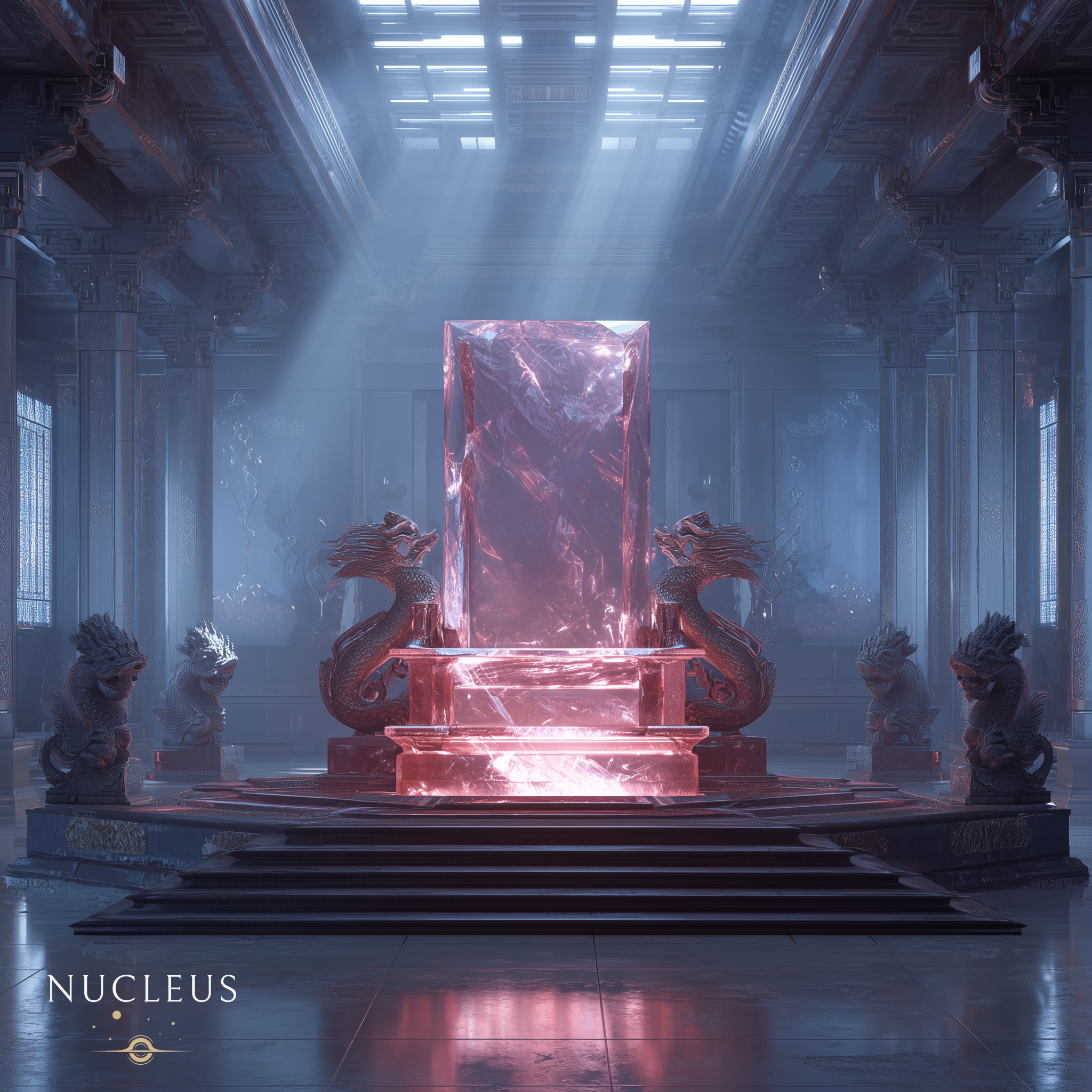
The Bloodline Doctrine
Under House Sun's rule, the Imperium crystallized its philosophy of genetic supremacy. Citizens were classified into rigid hierarchies:
Dragon-Blooded (正龍, Zhènglóng):
Those of verified Han Chinese ancestry, entitled to full citizenship and positions of power
Drake-Blooded (次龍, Cìlóng):
Other East Asians. Both Dragon-Blooded and Drake-Blooded are considered Imperials
Honor-Bound (譽人, Yùrén):
Foreigners who proved exceptional worth through service or talent
Unblooded (無血, Wúxuè):
All others, forever barred from true authority regardless of merit. An Imperial whose family has formerly rebelled against the Imperium is considered an Unblooded
This system would shape every aspect of Imperial society, from marriage laws to military promotion, creating a nation where one's DNA determined their destiny.
2184: Victory on Mars
Ten years later, the Imperium and Terra Alliance fought over Mars's southern hemisphere. The Imperium won. As part of the victory terms, both sides signed the Imperial-Valoran Joint Declaration.
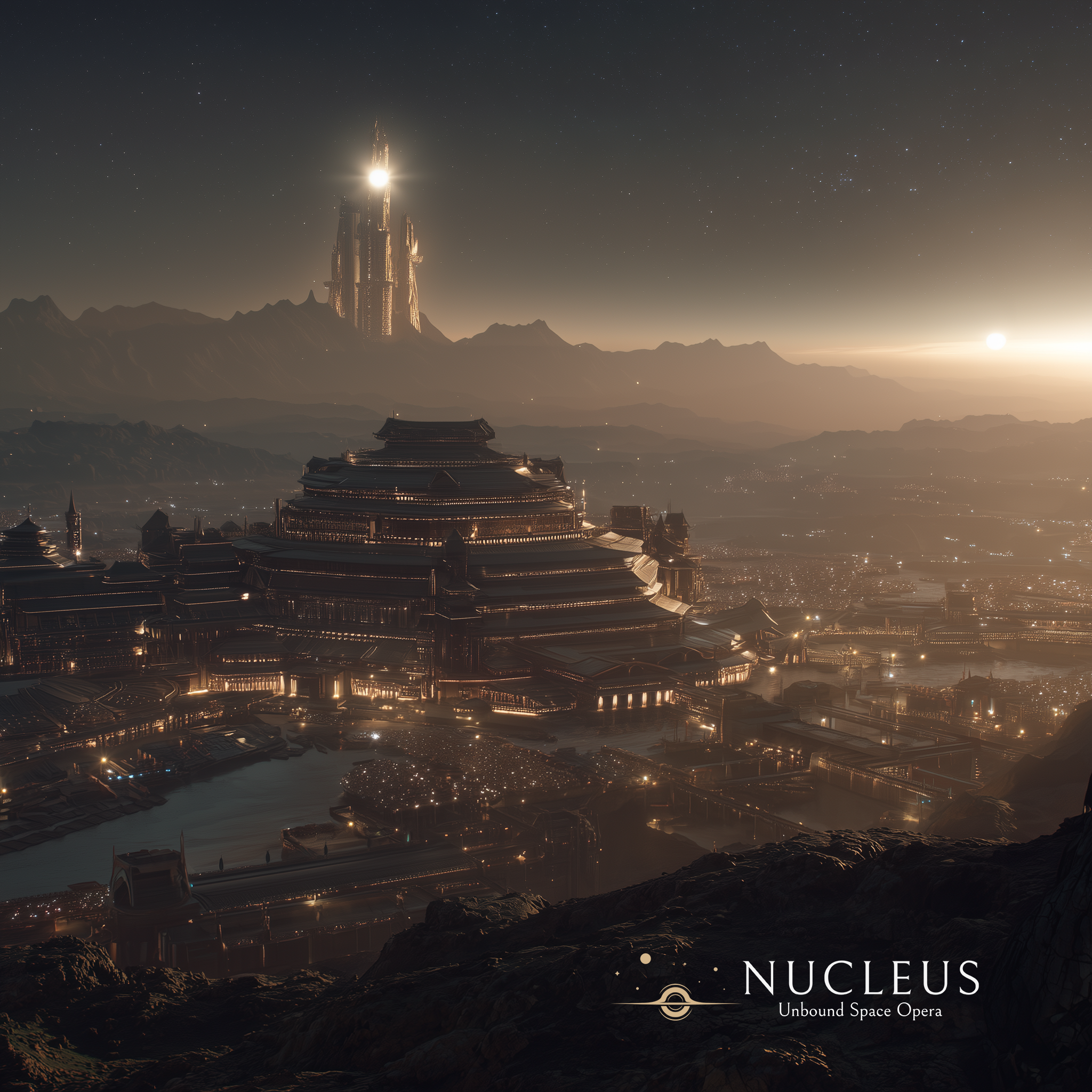
Key Terms of the Declaration:
Xing Hong (星虹), Mars's largest city, would transfer from Alliance to Imperial control
Transfer date: July 1st, 2197 (13 years later)
The city would maintain "sufficient democracy" under the "Formerly Alliance" principle
Both sides would respect existing property rights and contracts
2192: The Sand Lotus Emerges
A new religious movement called the Sand Lotus appeared in the Tarim Basin. They combined Buddhist teachings with psionic training, but their methods were controversial:
They believed in restoring democracy to the Imperium
They taught that sexual intimacy could unlock psionic powers
They practiced polyamory as part of their spiritual path
The Imperium immediately labeled them terrorists.

2194: The Imperial Crusade
Emperor Sun launched what he called a "purification campaign." In reality, it was a two-pronged assault:
Domestic Purges
Mass arrests of Sand Lotus members - thousands executed by "Flesh Pot" (fed alive to the bio-engineered monster)
Forced sterilization of "undesirable" genetic lines
Mandatory genetic testing to verify Han Chinese ancestry
Foreign Conquests
Thailand:
Invaded and conquered in 21 days
Vietnam:
Two months of brutal fighting before surrender
Taiwan:
The island that refused to join in 2072 was taken by force after ten weeks of resistance and massacre
Myanmar, Laos, Kazakhstan:
All fell within the year
Singapore:
Voluntarily became a vassal state to avoid invasion
Among historically Confucian nations, only Japan remained independent, protected by its advanced military, the sea and Terra Alliance reinforcements.
2199: Xing Hong Breaks Free
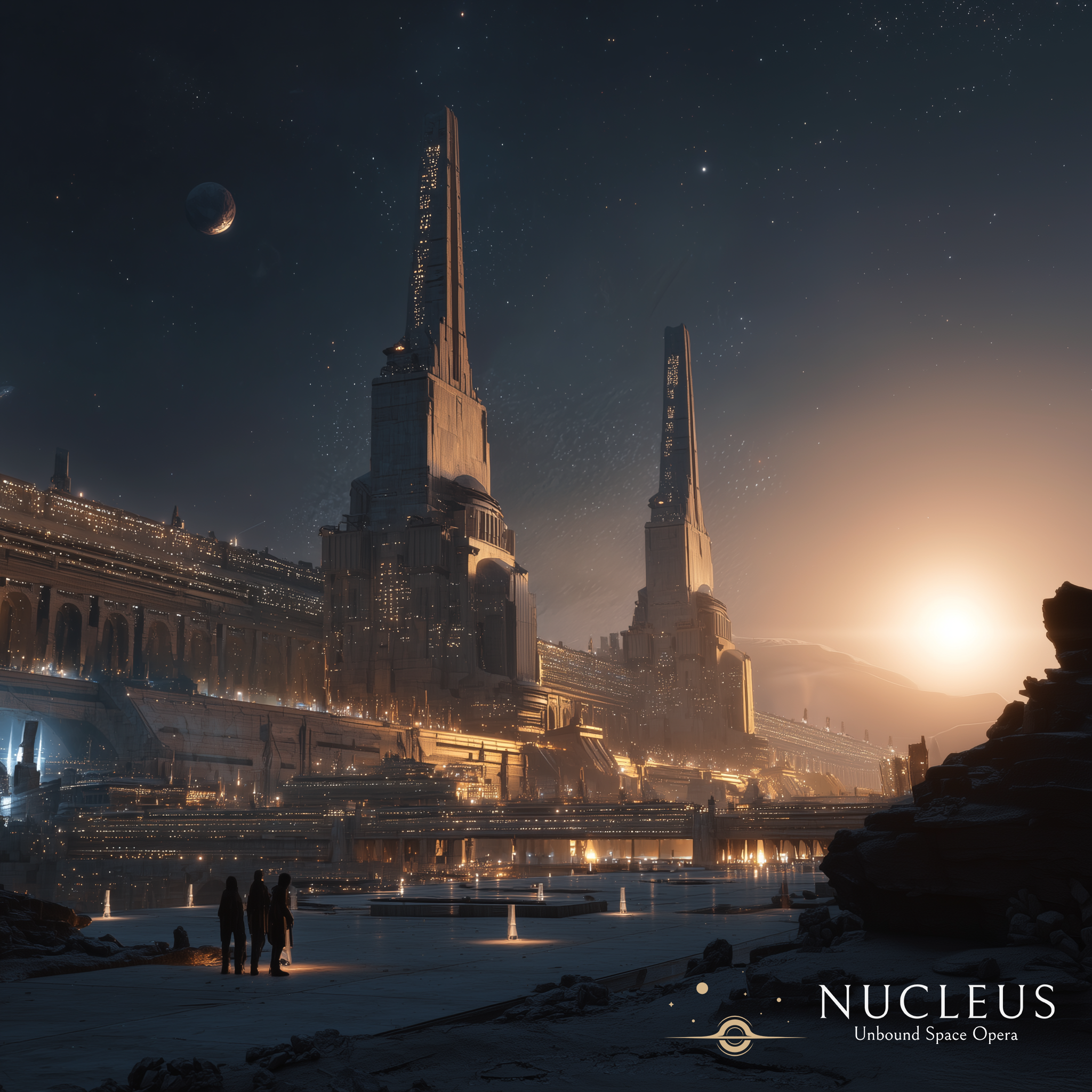
Just two years after taking control of Xing Hong, the Imperium lost it. Through clever politics and strategic bribes, the city's residents organized a vote for independence. The genius move? They made sure everyone got something:
Imperium:
Kept exclusive Zephyrium mining rights within 500km radius
Terra Alliance:
Secured 40% reduced tariffs on Helionite processing and exclusive contracts for NexLink Communications to build Mars's Quantum Entanglement Communication (QEC) network infrastructure
Emerald Directorate:
Gained duty-free port access and priority docking for all vessels affiliated
The city also established the "Mars Free Trade Zone" where all corporations could manufacture weapons and process fusion waste without Imperial regulations—a massive profit center.
Today, Xing Hong is an independent city-state—expensive, dangerous, and free.
Imperial Glory: A Century of Dominance
2202-2295
2241: The Quantum Supremacy Declaration
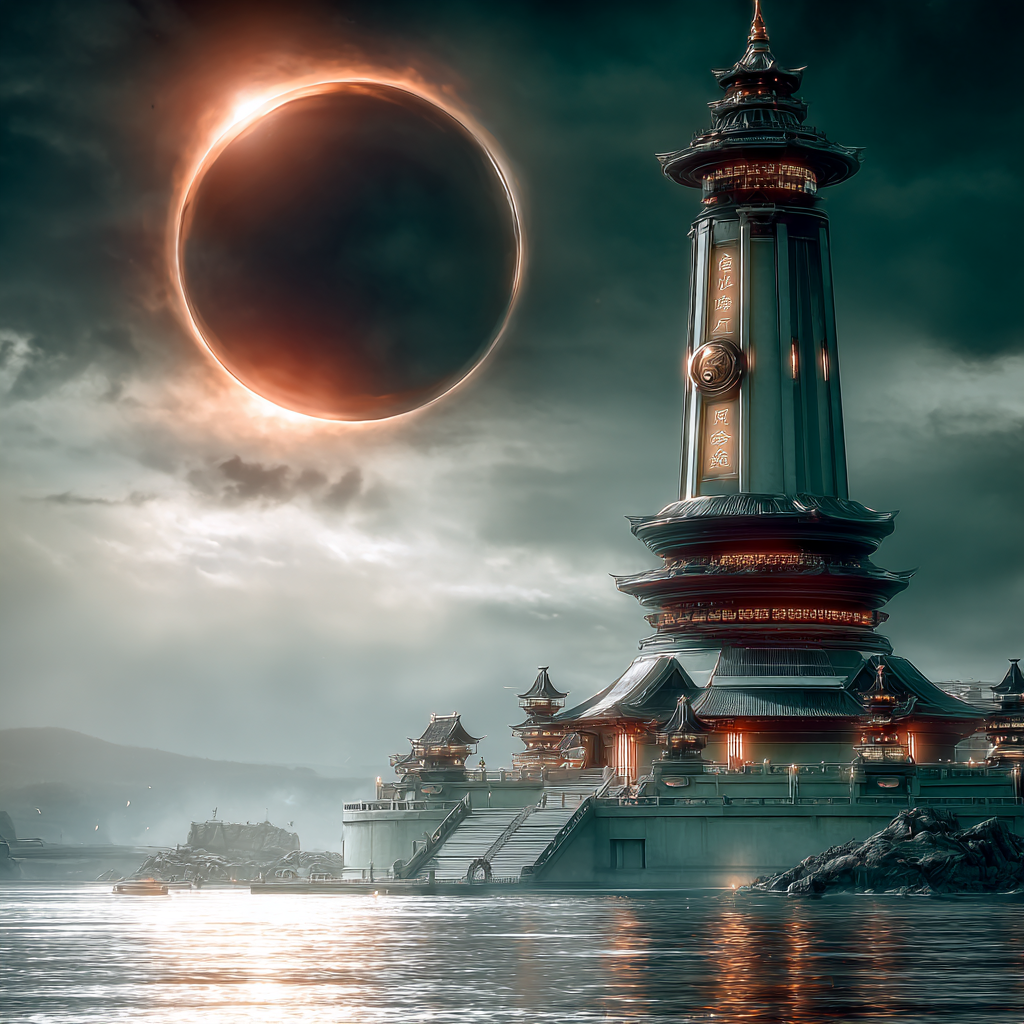
On March 15th, 2241, every screen in the Sol System displayed the same thing: the Imperial Dragon banner. For exactly 4 minutes and 44 seconds, the Imperial anthem played while personalized messages appeared for each world leader—in their native language, referencing their private conversations from the previous week.
If you come across this story on Amazon, it's taken without permission from the author. Report it.
2258: The Scarlet Wedding Reforms
When Emperor Zi-Yuan Sun took Mei-Chi Chen as his bride, she brought more than beauty and intelligence to the Ruby Throne. The daughter of Singapore's last Prime Minister understood that in an empire obsessed with bloodlines, the bedroom was as crucial as the battlefield.
Within months of her coronation, the Empress issued the "Harmonious Household Edicts"—a comprehensive reform of Imperial marriage law that would shape society for generations. On the surface, they protected women and ensured social stability. In practice, they created a system where every romantic liaison served the state.
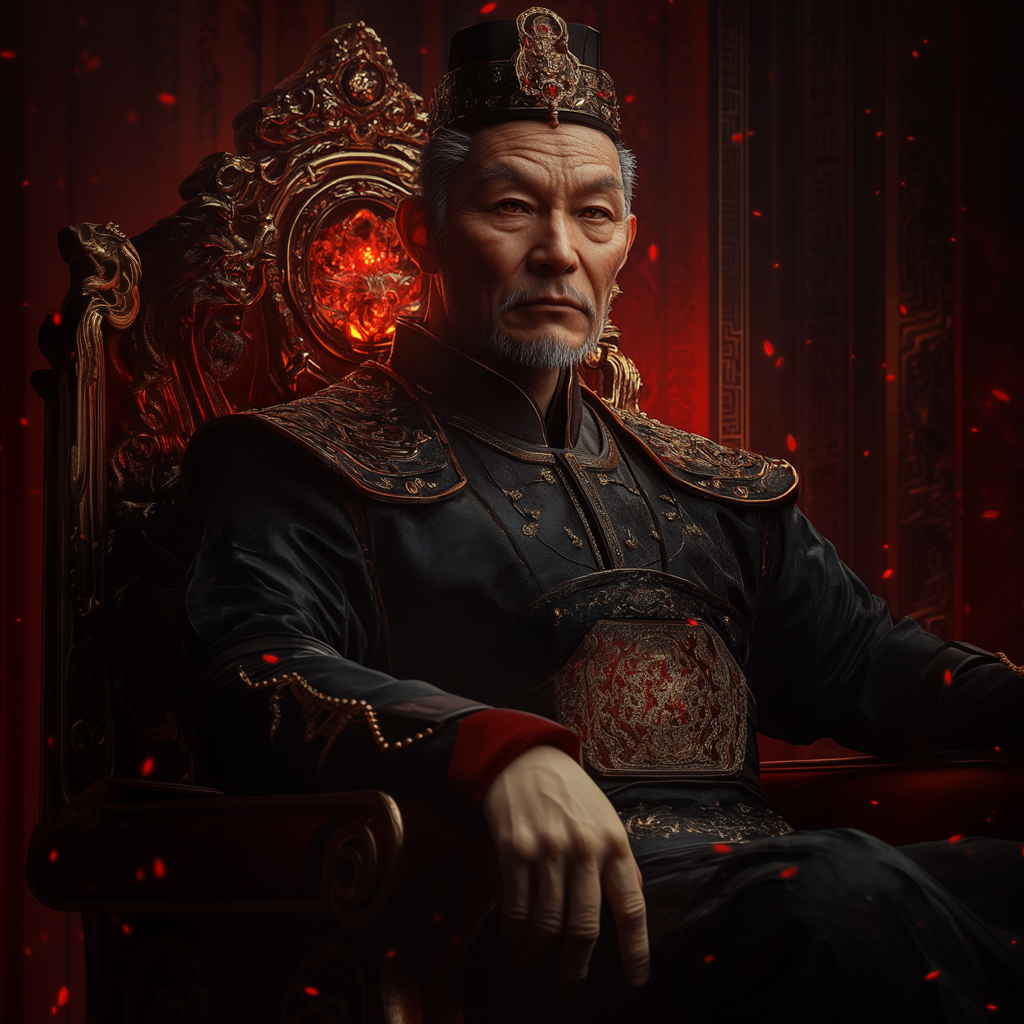
The Harmonious Household Edicts (和室詔)
Primary Marriage Rights:
Only marriages between genetic equals are recognized (Dragon to Dragon, Drake to Drake)
The primary wife holds absolute authority over all household matters
All children born to concubines legally belong to the primary wife, who decides their names, education, and futures
The Concubine Registry:
All concubines must be registered with the Ministry of Bloodlines
Genetic testing required to ensure "no contamination of inferior blood"
Concubines of Unblooded status permitted only if sterilized
Annual "fertility taxes" on registered concubines—waived if they produce children for the primary wife
Extravagant "Genetic Tribute (基因獻禮)" on July 7th every year—the most beautiful men and women sent to Chengdu, the capital on Earth, for potential selection
"Love is chaos. Marriage is order. The wise ruler channels passion into purpose, desire into dynasty. Let every embrace strengthen the Dragon's bloodline."
— Empress Mei-Chi Chen, presenting the Edicts to the Imperial Court
The reforms had immediate effects. Wealthy Dragon-Blooded families began collecting concubines like artwork, while poorer citizens found themselves priced out of romance entirely. The Empress herself selected twelve male concubines "to ensure the dynasty's future," though cynics noted she kept her own children while gifting the Emperor only daughters from his other women.
By making the primary wife the legal mother of all children, Mei-Chi eliminated succession disputes while ensuring loyalty. Concubines, knowing their children's futures depended on the wife's favor, became her most devoted servants. It was brilliant, cold, and utterly Imperial.
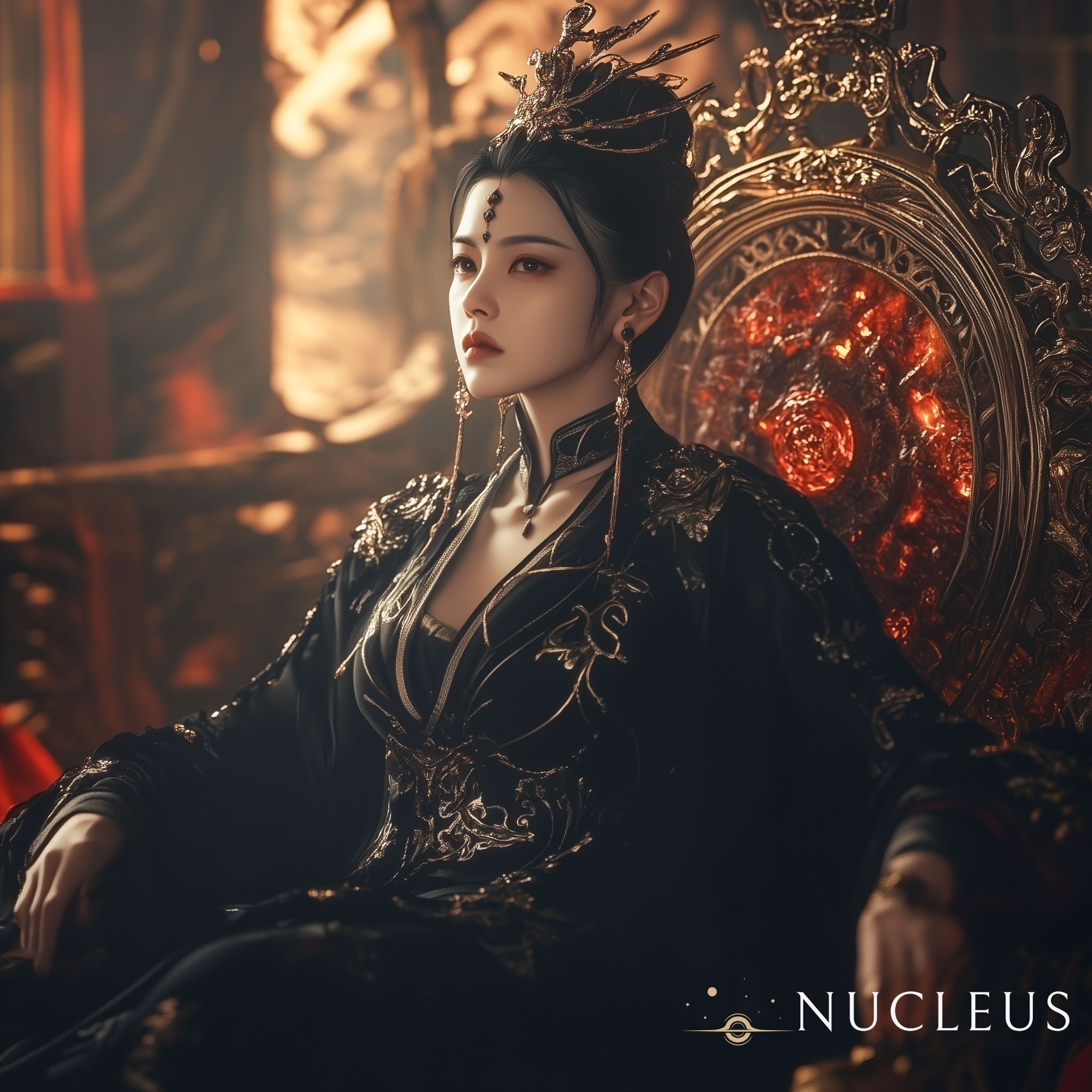
But the Empress's most controversial edict came months later, wrapped in the language of religious ritual and ancient tradition. As an Eclipse psion of considerable power, Mei-Chi understood energies that flowed beneath flesh—Aether, lust, and how to harvest them.
The "Mantis Garden Protocols" legalized what had been whispered about in Eclipse circles for centuries. Named for the praying mantis's fatal mating habits, these protocols allowed female Eclipse psions to take "Supplicants"—willing men who would trade their life essence for the privilege of intimacy with power.
The Mantis Garden Protocols (螳園交)
The Mantis Contract:
Female Eclipse psions may maintain "Supplicants" outside marriage bonds
Supplicants must submit to their mistress's desires without refusal or hesitation
Each coupling drains life essence and Aether from supplicant to practitioner
Supplicants must sign death waivers acknowledging "terminal essence depletion"
The stronger the Eclipse psion, the faster the drain. The best Eclipse psions can drain a man to death in under five sexual encounters
The Rejuvenation Effect:
Regular coupling through this method harvests potent Aether and halts the practitioner's aging completely
Multiple supplicants can reverse aging by decades
The Empress maintains precisely 69 supplicants in rotating service
Imperial physicians confirm she retains the body of a 29-year-old at age 78
Legal Restrictions:
Male Eclipse psions explicitly forbidden from taking female supplicants (penalty: death)
Supplicants must not be Dragon-Blooded—"inferior blood are pork to be consumed, while superior ones are jewels to be cherished"
Minimum age 21, maximum age 35 for optimal "harvest quality"
"Why should women alone bear the burden of aging while men scatter their essence carelessly? The mantis teaches us wisdom. Those who would mate with power must be prepared to feed it. Their sacrifice ensures the Imperium's strength flows through its most capable vessels."
— Empress Mei-Chi Chen, defending the Protocols before the reformed Imperial Court
The protocols created a disturbing new dynamic in Imperial society. Young men of good breeding began volunteering as supplicants, seduced by promises of transcendent pleasure and proximity to power. Families would mourn sons who entered the Mantis Gardens, knowing they signed their own death warrants for a few years—sometimes mere months—of ecstasy.
The Empress herself became living proof of the practice's effectiveness. Courtiers whispered that she drained a new supplicant every week, maintaining her ethereal beauty while leaving behind husks of men who entered her chambers at 25 and emerged looking 70. When international critics questioned the ethics, she simply smiled and noted that no man was forced—all her supplicants died in bliss.
2263: The Great Typhoon of Venus
Typhoon Amaterasu formed from a deadly combination of solar flares and volcanic eruptions. With winds exceeding 800 km/h and acid rain that could melt titanium in minutes, it threatened to erase 60% of Venus's human infrastructure—nearly 2 million lives.
The Imperial Court was divided. Many advised the Emperor to let their enemies' colonies burn. But his wife, Empress Mei-Chi Chen, saw a greater opportunity.
"Today we save our enemies, so tomorrow they will kneel willingly."
— Empress Mei-Chi Chen

The rescue operation burned through 50 years of Zephyrium reserves in just 72 hours. Imperial weather satellites formed a net around Venus, firing synchronized energy bursts that gradually dissipated the storm and restored the planet's atmosphere to habitable parameters. The Empress personally commanded from the bridge of the Dragonfort Celestial Claw, staying awake for three straight days, while Admiral Zu-Shao Qin assisted her.
The Aftermath: Within the year, two ex-Alliance mega corp switched allegiance from the Alliance to the Imperium. ZenFusion and Venusian Highlands Company cited "gratitude for Imperial protection" in their official statements. For his contribution, Zu-Shao Qin was promoted to Governor of Taiwan, returned to his homeland as hero and ruler. Dilinur Altai, then an Unblooded in her elementary school years, her original family defeated and slaughtered in a failed uprising, would be transferred from an internment camp on Mercury and given to Shao as servant girl.
The Imperium's gamble had paid off.
2277: The Night of Silver Stars
Operation Celestial Housekeeping (天界清明)
October 1st, 2277 | 2:00 AM Beijing Standard Time
200+ targets eliminated across 3 planets and 7 moons in perfect synchronization
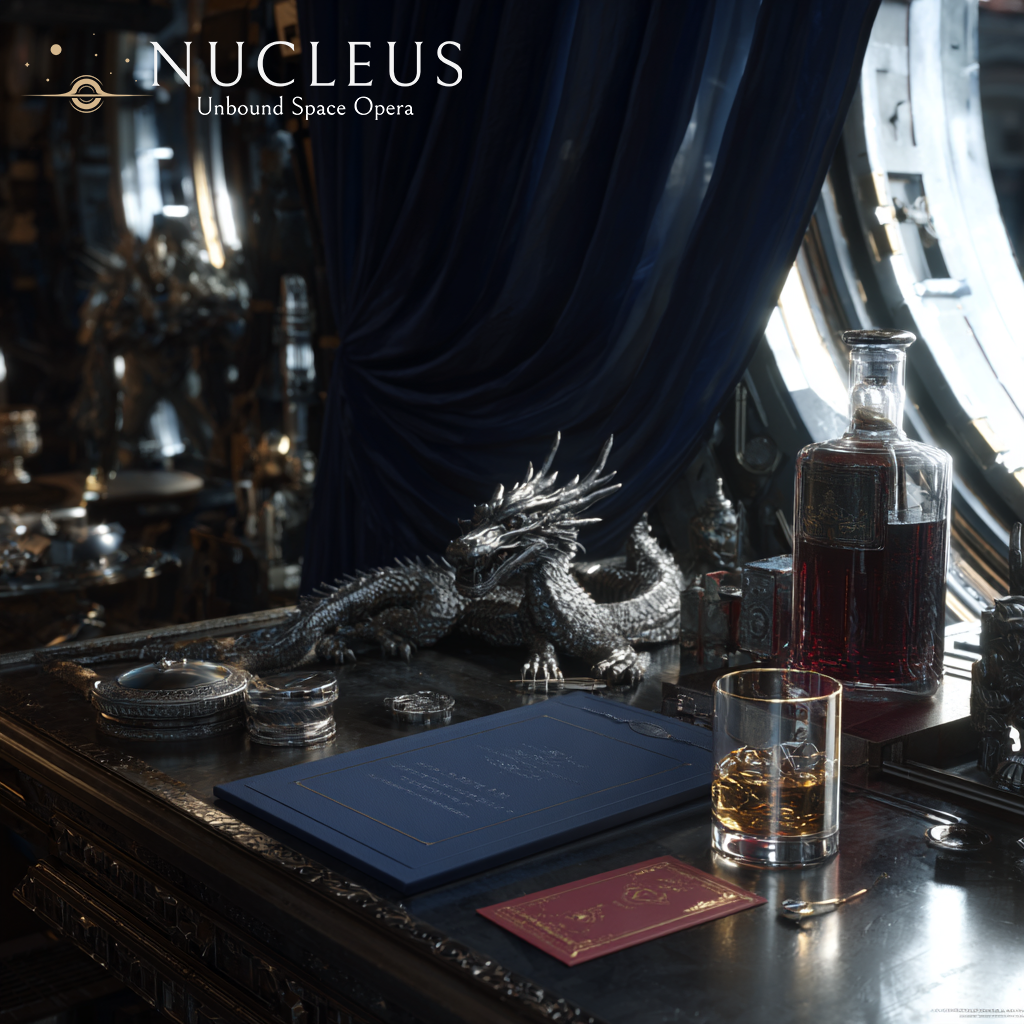
Five years of preparation. Several Imperial Amber-Eye agents married their targets' siblings. Others spent years as janitors, slowly earning trust while mapping security systems. The silver dragon figurine left in each target's residence were crafted from lunar titanium, with the victim's "crimes against the Ruby Throne" etched in microscopic Mandarin characters in crimson calling cards.
The message was clear: The Imperium could wait, watch, and strike anywhere in the Sol System.
The most audacious kill involved Overseer Maria Santos of the Alliance Corporate Chamber, eliminated in her bunker 200 meters beneath Chicago. If the Imperium could reach her there, nowhere was safe. Unexpectedly, her death incited widespread anti-Imperium sentiments in Terra Alliance populace, leading to the election of Dante Pompeo, the current Overseer known for his temper and aggressive attitudes towards all foreign powers.
Aftermath:
The Sand Lotus, now the last rebellion force against the Imperium, permanently moved all operations off Earth
The worldwide assassinations alerted all other major powers. Thus began the decades-long cold war between the Terra Alliance (North America), the Imperium of Dragons (Asia) and the Emerald Directorate (Africa + Latin America)
As a result of said cold war, humanity's combined defense against Radi-Mon hordes has been weakened substantially
2295: The Dragon's Twilight
As the Imperium enters its 224th year, it stands as the Sol System's undisputed military hegemon. Yet within the Brocade Celestial Palace, shadows lengthen across the Ruby Throne.
Emperor Zi-Yuan Sun, now past his second century, increasingly delegates court sessions to his advisors. Courtiers whisper of mood swings and forgotten names, though none dare speak openly. The Ruby Throne still accepts him, but some wonder if its judgment has limits.
Meanwhile, Empress Mei-Chi Chen maintains her ethereal youth through the Mantis Gardens. At court gatherings, her gaze often lingers on Prince Joon-Seok Pak of Choson—a decorated war hero whose Eclipse mastery rivals her own. When she speaks of "securing the dynasty's future," observers note how frequently the Prince features in her examples.
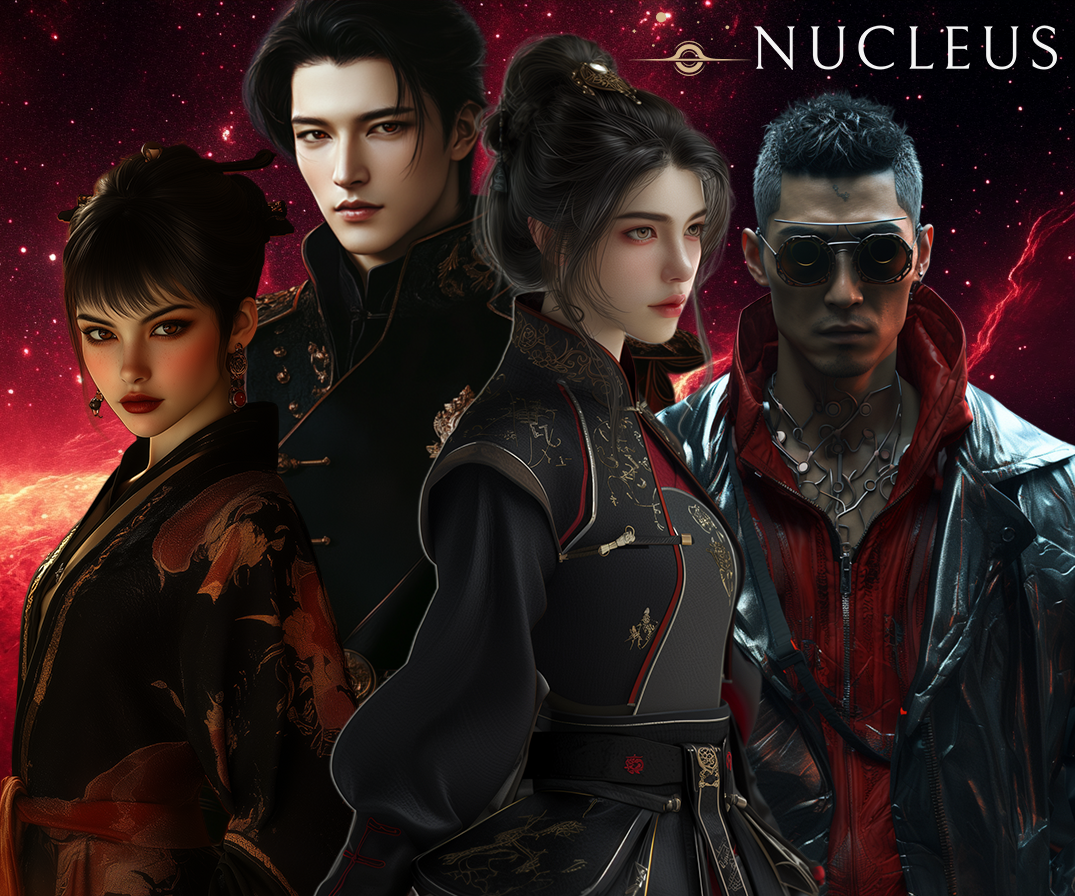
Notable Figures at Court (the Golden Serpants):
Prince Joon-Seok Pak: The Empress's "favorite general," frequently invited to private strategy sessions. Dragon-blooded
Dilinur Altai: The Unblooded orphan who rose to Prefect of Taiwan—a feat that should be impossible under Imperial law
Kaori Ouyang: A Drake-blooded born on Xing Hong, Mars. Proper upbringing, physical combat prowess, notable skills in Phoenix SMG and Thermal Dagger
Iron Roach: Drake-blooded. Underground criminal turned faithful cyborg
Governor Zu-Shao Qin: Drake-blooded. Taiwan's iron-fisted ruler who somehow transformed his servant girl into a Prefect. What did he extort from her in exchange?
"The Ruby Throne chooses its occupant, but even thrones can be... influenced by those who understand their nature. After all, I've spent nearly a century studying every facet of its crystalline structure."
— Empress Mei-Chi Chen, private conversation with Prince Joon-Seok
The Empress watches Dilinur Altai with particular interest. No Unblooded has ever risen above Peon status, yet this Uyghur woman commands respect even from Dragon-Blooded officers. Her mysterious elevation hints at capabilities—or protections—that defy Imperial doctrine. In the game of thrones, wildcards are dangerous.
As humanity's cold war continues and Radi-Mon sightings increase, the Imperium's future hangs on a question no one dares ask aloud: What happens when an immortal Empress outlives her Emperor?
 NOVEL NEXT
NOVEL NEXT